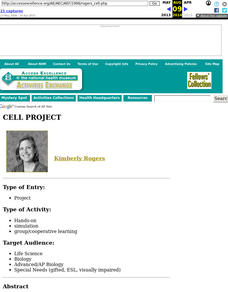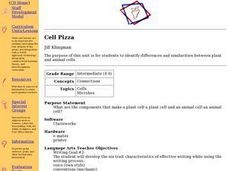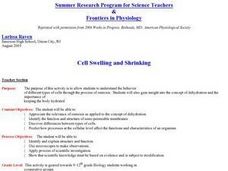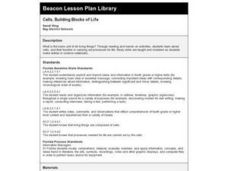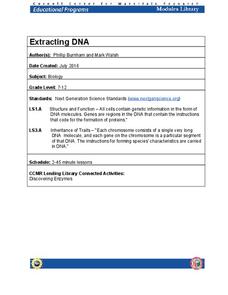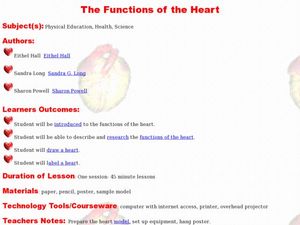Curated OER
Cell Size and Shape; Diffusion and Osmosis Processes
Use salmon eggs as a cell model for demonstrating the movement of water over concentration gradients. Junior scientists examine the same process microscopically with an onion cell. They use a thistle tube and a semipermeable membrane to...
Curated OER
Cell Wall Recipe: A Lesson on Biofuels
Biotech engineers discover that changes in the DNA code for cell wall formation can help create crops better suited for biofuel production. They extract DNA from wheat germ. They decode paper strips with codes and relate the activity to...
Cornell University
Build a Fuel Cell
Discover the connection between redox reactions and fuel cells. Collaborative groups build a Hoffmann Apparatus that demonstrates the electrolysis of water and then convert their models into a fuel cell. They use their fuel cells to...
Curated OER
Looking Inside Cells
Seventh graders examine the functions and roles of membranes in cells. They discover the differences between plant and animal cells.
Curated OER
Spotlight On Stem Cells
Students discover the differences in how stem cells develop and function depending on their source. They see how scientists are using stem cells - from a variety of sources - to study how they can be used to cure certain illnesses and...
Curated OER
Cell Project
Students investigate cells. They discover what cells are, where they are found, what they do and what they are made of. They construct a giant cell that is posted on the bulletin board.
Curated OER
Two-Cell Battery
Students build their own two-cell battery and determine which electrolyte solution is best suited for making a battery. They discuss background information for their experiment, construct and test their battery, and using the chart on...
Curated OER
Cell Pizza
Young scholars identify parts and functions of microscope. Students watch video, Cells and Life about cell parts with actual pictures and actual cells. Young scholars discuss video and identify parts of the cells that animals and plants...
Curated OER
Cell Me What?
Students compare and contrast the characteristics of robots and cells. In this biology lesson, students examine the parts and function of cell organelles. They create a visual representation of their cell/robot analogy.
Curated OER
Cell Swelling and Shrinking
Pupils examine the concept of osmosis in relation to dehydration. They identify the function and structure of semi-permable membranes. They predict how certain processes can affect the characteristics of an organism.
Curated OER
Cells in the Making
Students examine and research the parts of a cell, their functions, and life processes. They simulate how cells receive nutrients using coffee filters, water, and coffee, and construct cells using pudding, cookie dough, and candy.
Curated OER
The Incredible, Edible Cell
Students discover organelles and the functions organelles perform in cells. In this biology lesson, students create model cells using Jell-o, then dissect their "cell" to examine the parts that create a cell. Students create a diagram as...
Curated OER
How Do Cells Reproduce?
Students discuss the importance of reproduction of cells. They identify and describe the stages of Mitosis. They discover what happens to chromosomes and DNA during reproduction.
Curated OER
A Hands-On Paper Activity Examining The Relationship Between Hierarchical Levels Of Structure And Function
Students investigate how complex functions arise in biological systems through the creation of several paper structures to accomplish various tasks such as remaining suspended in air for the longest time, making the loudest noise and...
Curated OER
Cells, Building Blocks of Life
Fourth graders, in groups, explore cells, the basic unit of all living things.
Curated OER
Getting Up the Nerve
Students examine the basics of the nervous system through an interactive program. They discover how the brain is linked to muscle movement. They can test cells through the interactive program to see how it reacts to different stimuli.
Curated OER
Cell Structure and Function
Students compare the organelles present in plant and animal cells. For this biology lesson, students create an analogy to easily remember their assigned organelles. They also research their function and write a creative story.
Cornell University
Extracting DNA
Uncover the basics of DNA structure through exploration activities. Collaborative groups build DNA models and recreate the process of replication. Then, using plant cells such as peas or strawberries, they extract a DNA sample.
Curated OER
Your Eyes Saw My Unformed Body: closing lesson
For those who teach and believe in Intelligent Design, this lesson is perfect. Religion students read and discuss Psalm 139: 1-18, and present their cell representation in class. They then watch a speech by Louie Giglio about the protein...
Curated OER
Discovering Pi
Define terminology related to a circle. Practice accuracy in measuring and then create a spreadsheet based on data collected from solving for parts of a circle. Groups can have fun analyzing their data as it relates to Pi.
Curated OER
Amino Acids and Protein
Learners study amino acids and discover the different proteins that are in our bodies. In this living environment instructional activity students build protein bracelets with beads as an example of the different amino acids.
Curated OER
Feed Your Cells
Learners examine and research the human digestive system and what happens to the food we eat. They read the article, The Passage of Food, participate in an experiment with crackers, and write a paragraph summarizing the function of the...
Curated OER
The Functions of the Heart
Students explore the function of the human heart. In this heart anatomy activity, students participate in activities offered at an Internet website to discover the characteristics and jobs of the parts of the human heart.
Curated OER
The Case of Regulation in Cells
After your biologists have learned about transcription, translation, and gene regulation, they work in a small group to create a poster of a system that serves as an analogy of the gene regulation process. They share their creations with...







